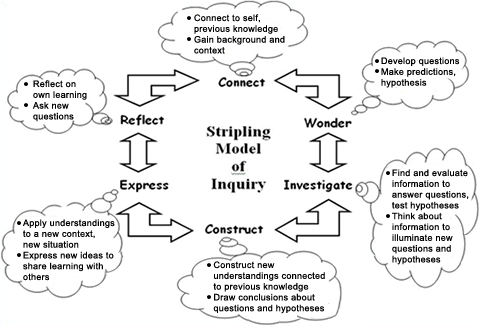What is Inquiry?
I went through Grad school at SFU not too long ago and the vast majority of our work was inquiry-based. It was highly practical and had a lasting influence on my teaching practices. I couldn’t locate an image of SFU’s Inquiry Process so I borrowed this Stripling Model of Inquiry from the Library of Congress site:
If our intentions this week are to pursue an inquiry into how we can shift school culture through technology then I suppose I’m on the right track. Or am I? My mind right now:
I do know that the Inquiry Process begins with a question, a wondering…
My Question so far: How can I use a class blog/website to communicate with parents to improve their involvement and appreciation for what we are doing at school?
(Rough) Hypothesis: I can imagine parents deriving both amusement and understanding from the communication I can provide via a website. I expect that they will have fewer questions and therefore, will have less need to ask me and other parents about what’s happening at school. I know that parents have requested more information from me about what we’re doing in class and an open site would address this need/desire. I feel that sharing our learning more effectively will allow parents to see all of the wonderful things we are doing at school and thereby enhance their interest/enthusiasm about the offerings of school. I believe, in some cases, parents will be able to better support their child’s learning.
**Will having a class website/blog foster cultural change between parents and school? Will creating a class website/blog improve communication and relationships with those who participate? Yes and yes.**
Now how does all that relate to the Linguistic Cognitive Domain??
________________________________________________________________________________________________
I have been asked to try to understand Humberto Maturana’s theory of language and cognitive science. (Probably why my mind feels like a whirlwind!!) I do not have any background in this and I am slow to understand these complex theories. Here’s what I have understood though I am quite sure I am may be incorrect in these interpretations:
From class: the linguistic cognitive domain relates to creating feelings through the way we communicate, speak (i.e. speaking to parents in a way that either creates/improves relationships or pushes them away)
From Humberto Maturana:
-living organisms are self-sustaining (autopoiesis)
-organisms create their world rather than the world creating them
-we use language as a way to navigate/create the world (ongoing interactions)
-language creates our connections and causes structural changes based on these interactions
-Composite Unity: Individual unities compose a composite (individuals working together)
_______________________________________________________________________________________________
I am still trying to make sense of these theories so I have cited Vincent Kenny’s interpretation of “Languaging” and other theory by Humberto Maturara to remind me:
‘”All that takes place in human life is languaging, and all that takes place in languaging is conversations”‘.
“‘These are continuous mutual grooming interactions. We immerse ourselves in structural drift contingent to the conversations in which we participate and which we generate through our structural dynamics'”.
“‘Thus we say that the words were smooth, caressing, hard, sharp, and so on: all words that refer to body touching. Indeed we can kill or elate with words as body experiences. We kill or elate with words because, as co-ordinations of actions, they take place through body interactions that trigger in us body changes in the domain of physiology.'” (1988:p 48).
“-Languaging interactions are powerful perturbations.
-These trigger structural changes.”



Great work, Jorden! I am so happy you tackled these terms on your own. If you think of the linguistic cognitive domains of the parents, you can pitch the text and images on your site to meet them where they are, and then draw them into your world by expanding on what you are saying or showing them.